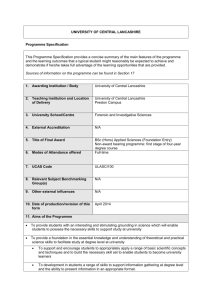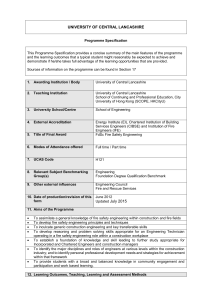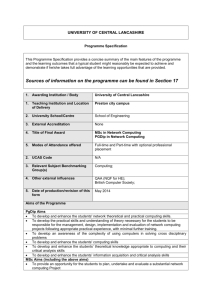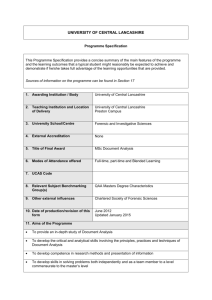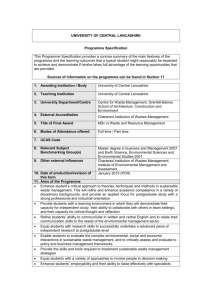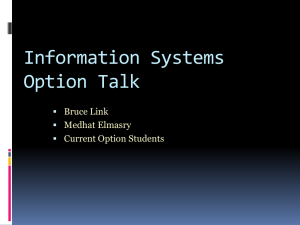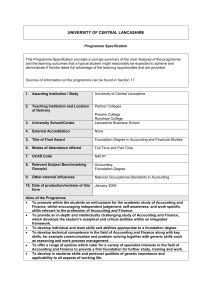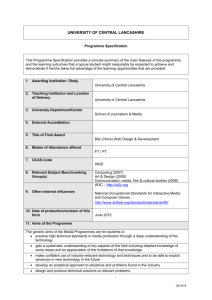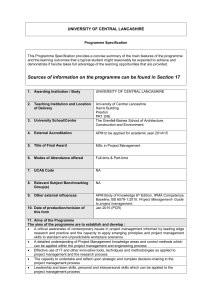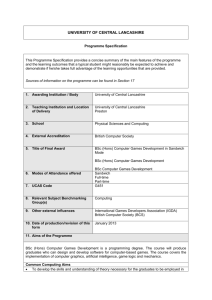BSc (Hons) Fire and Leadership Studies (July 2015)
advertisement
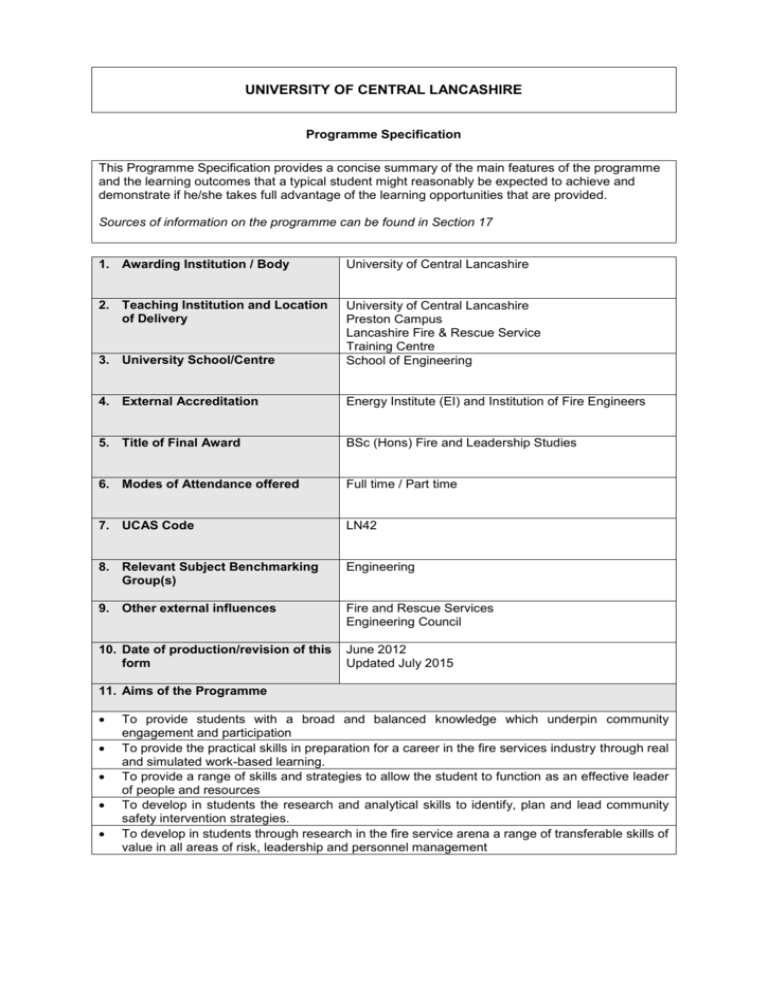
UNIVERSITY OF CENTRAL LANCASHIRE Programme Specification This Programme Specification provides a concise summary of the main features of the programme and the learning outcomes that a typical student might reasonably be expected to achieve and demonstrate if he/she takes full advantage of the learning opportunities that are provided. Sources of information on the programme can be found in Section 17 1. Awarding Institution / Body University of Central Lancashire 2. Teaching Institution and Location of Delivery 3. University School/Centre University of Central Lancashire Preston Campus Lancashire Fire & Rescue Service Training Centre School of Engineering 4. External Accreditation Energy Institute (EI) and Institution of Fire Engineers 5. Title of Final Award BSc (Hons) Fire and Leadership Studies 6. Modes of Attendance offered Full time / Part time 7. UCAS Code LN42 8. Relevant Subject Benchmarking Group(s) Engineering 9. Other external influences Fire and Rescue Services Engineering Council 10. Date of production/revision of this form June 2012 Updated July 2015 11. Aims of the Programme To provide students with a broad and balanced knowledge which underpin community engagement and participation To provide the practical skills in preparation for a career in the fire services industry through real and simulated work-based learning. To provide a range of skills and strategies to allow the student to function as an effective leader of people and resources To develop in students the research and analytical skills to identify, plan and lead community safety intervention strategies. To develop in students through research in the fire service arena a range of transferable skills of value in all areas of risk, leadership and personnel management 12. Learning Outcomes, Teaching, Learning and Assessment Methods A. Knowledge and Understanding A1. Describe and evaluate the main stakeholders, both statutory and voluntary organisations, with an interest in the promotion of a safe and healthy community and their respective roles. A2. Identify and review the role and significance of HRM as a function and an activity and locate this in the context of the employment relationship. A3. Deliberate on major issues which may inhibit or extend community engagement and cohesion A4. Discuss a range of leadership skills and synthesise strategies which can improve the performance of individuals and organisations A5. Discuss and evaluate legislation and national policies which aim to promote a safe and healthy population within both the domestic and industrial setting Teaching and Learning Methods Lectures, seminars, tutorials, workshops, directed reading, problem solving, case studies. Assessment methods Examinations, coursework, written reports, essays, presentations, data analysis exercises and group projects. B. Subject-specific skills B1. Discuss and critically evaluate the importance of fire safety systems, and evacuation procedures, taking into account the inter-relationship with reaction times for people of differing age, health, gender and dependency B2. Apply knowledge and understanding of the causes of fire (both direct and indirect) to plan, deliver and manage a community safety campaign B3. Demonstrate an understanding of ‘means of escape’ from design, legislative requirements and the implementation of fire safety management systems. B4. Demonstrate an understanding of the fire investigation process including the important roles and evidence associated with different fire safety agencies and personnel participating in fire investigation and how the results of fire investigation can influence future intervention strategies Teaching and Learning Methods Lectures, seminars, tutorials, workshops, directed reading, problem solving, case studies, field visits. Assessment methods Examinations, coursework, written reports, essays, presentations, data analysis exercises and group projects. C. Thinking Skills C1. Critically review the political, economic and social factors associated with a fulfilling a role in management and leadership in public sector organisations C2. Analyse the impact of risk management on the operations in the public sector organisations in pursuit of their statutory duties and policies C3. Critically review the benefits of performance management, change management, leadership and strategic planning within the arena of Fire and Rescue Services. C4. Identify and interpret statistical evidence to inform future development C5. Analyse how changes in human behaviour can be made to foster a safer and healthier environment and provide solutions to problems Teaching and Learning Methods Lectures, seminars, tutorials, workshops, directed reading, problem solving, case studies. Assessment methods Examinations, coursework, written reports, essays, presentations, data analysis exercises and group projects. D. Other skills relevant to employability and personal development D1. Demonstrate communication and presentation skills, covering arrange of communication media D2. Exhibit numeracy and computational skills, including ICT skills, statistical analysis and information retrieval D3. Evidence interpersonal skills, relating to interaction with other people from varied backgrounds and cultures and to engage in team working D4. Display time-management and organisational skills as evidenced by the ability to plan and implement efficient and effective modes of working D5. Work independently under minimum supervision to produce a substantive piece of work. Teaching and Learning Methods Discussions and presentations, practical exercises, formal lectures, use of case studies, tutorials, student led activities, workshops, IT through coursework. Assessment methods Examinations, coursework, written reports, essays, presentations, data analysis exercises and group projects. 13. Programme Structures* Level Level 6 Module Code FV3500 FV3004 FV3101 FV3103 20 Bachelor Honours Degree in Fire and Leadership Studies Requires 360 credits including a minimum of 220 at Level 5 or above and 100 at Level 6. Bachelor Degree in Fire and Leadership Studies Requires 320 credits including a minimum of 180 at Level 5 or above and 60 at Level 6. Fire Safety Management and Legislation Accidents and Catastrophes Safety, Health and Environment Project Management Community Fire Safety Strategies Managing Personnel and Human Resources Work Organisation and Change 20 Diploma of Higher Education in Fire and Leadership Studies Requires 240 credits including a minimum of 100 at Level 5 or above. 20 HR1000 Introduction to Combustion and Fire Safety and Fire Law Buildings, Material and Fire Community Fire Safety Skills for Science and Engineering Leadership and Motivation FV1503 Operational Firefighting 20 FV2004 FV2101 FV2102 FV2103 FV2501 HR2050 HR2015 Level 4 Fire Studies Dissertation Fire Investigation Strategic Risk Decision Making Hazards and Risk Management Leadership and Change Management Credit rating 40 20 20 20 HR3013 Level 5 Module Title 14. Awards and Credits* FV1001 FV1101 FV1207 FV1501 FV1502 Or 1 module of elective if appropriate 10 20 10 20 20 20 10 20 20 10 20 Certificate of Higher Education in Fire and Leadership Studies Requires 120 credits at Level 4 or above. 15. Personal Development Planning PDP is delivered and monitored through skills modules and the personal tutor system. Students are provided with a PDP handbook in electronic format and are introduced to the idea by their personal tutor (PT). Their PT will then guide them throughout their time at university, both in constructing their PDP and in making sure that they are developing the right skills, helping them to identify and address any issues. Each student sees their PT six times a year (seven in year 1) for a small group tutorial where the PT and other students will discuss a particular skill or employability issue. Typically the student will have prepared a document or done a task in preparation for the meeting. Topics targeted at meetings include time management and vocabulary developing at Level 4, ranging up to psychometric testing and help with job applications at Level 6. These tutorials help students to identify and develop their skills and also encourage a culture of confidence between tutee and PT, so that if any specific problems arise with a student the PT will be in a position to assist. The PT topics are constantly reviewed and updated in response to current practice in the workplace and to feedback from PTs and tutees. PTs insist on seeing a completed PDP before writing references. 16. Admissions criteria Programme Specifications include minimum entry requirements, including academic qualifications, together with appropriate experience and skills required for entry to study. These criteria may be expressed as a range rather than a specific grade. Amendments to entry requirements may have been made after these documents were published and you should consult the University’s website for the most up to date information. Students will be informed of their personal minimum entry criteria in their offer letter. Applicants will normally be required to have, one of: BBC at A2, ND DMM. Pass Access Course with Distinctions in 30 Level 3 Credits. IB - 25p. In addition applicants will be required to have Maths and English GCSE at Grade C or equivalent. Applicants will be required to have a minimum level of proficiency in English Language equivalent to IELTS grade 6 with no subscore lower than 5.5 Applications from individuals with non-standard qualifications, relevant work or life experience and who can demonstrate the ability to cope with and benefit from degree-level studies are welcome. If candidates have not studied recently they may be required to undertake an Access programme. APL/APEL will be assessed through standard University procedures. Please consult the UCLAN admissions department for the most up to date requirements. 17. Key sources of information about the programme University web site (www.uclan.ac.uk) UCAS web site (www.ucas.ac.uk) School website (www.uclan.ac.uk/forensic) Course Leader Admissions tutor 18. Curriculum Skills Map Please tick in the relevant boxes where individual Programme Learning Outcomes are being assessed Programme Learning Outcomes Module Level Code Module Title Core (C), Compulsory (COMP) or Option (O) Knowledge and understanding LEVEL 4 LEVEL 5 LEVEL 6 A1 FV3004 Fire Investigation COMP FV3101 Strategic Risk Decision Making COMP FV3103 Hazards and Risk Management COMP FV3500 Fire Studies Dissertation COMP FV2102 Safety Health and Environment COMP FV2103 Project Management COMP FV2501 Community Fire Safety Strategies HR2050 Managing Personnel and Human Resources HR2015 Work Organisation and Change COMP FV1001 Introduction to Combustion and Fire FV1101 Safety and Fire Law COMP FV1207 Building Materials and Fire COMP FV1501 Community Fire Safety COMP HR1000 Leadership and Motivation A3 A4 A5 B3 B4 √ COMP O COMP D1 D2 D3 D4 D5 C5 C4 C3 C2 COMP C1 COMP COMP B2 Thinking Skills COMP COMP B1 C HR3013 Leadership and Change Management FV2004 Fire Safety Management and Legislation FV2101 Accidents and Catastrophes FV1502 Skills for Science and Engineering FV1503 Operational Firefighting A2 Subject-specific Skills Other skills relevant to employability and personal development Note: Mapping to other external frameworks, e.g. professional/statutory bodies, will be included within Student Course Handbooks
